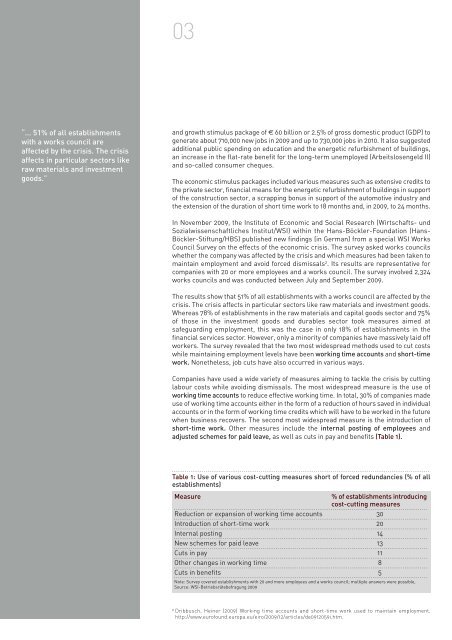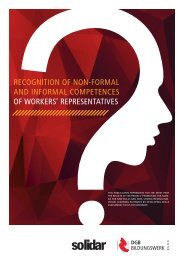The changing labour market in Germany in times of crisis - Solidar
The changing labour market in Germany in times of crisis - Solidar
The changing labour market in Germany in times of crisis - Solidar
You also want an ePaper? Increase the reach of your titles
YUMPU automatically turns print PDFs into web optimized ePapers that Google loves.
03<br />
“... 51% <strong>of</strong> all establishments<br />
with a works council are<br />
affected by the <strong>crisis</strong>. <strong>The</strong> <strong>crisis</strong><br />
affects <strong>in</strong> particular sectors like<br />
raw materials and <strong>in</strong>vestment<br />
goods.”<br />
and growth stimulus package <strong>of</strong> € 60 billion or 2.5% <strong>of</strong> gross domestic product (GDP) to<br />
generate about 710,000 new jobs <strong>in</strong> 2009 and up to 730,000 jobs <strong>in</strong> 2010. It also suggested<br />
additional public spend<strong>in</strong>g on education and the energetic refurbishment <strong>of</strong> build<strong>in</strong>gs,<br />
an <strong>in</strong>crease <strong>in</strong> the flat-rate benefit for the long-term unemployed (Arbeitslosengeld II)<br />
and so-called consumer cheques.<br />
<strong>The</strong> economic stimulus packages <strong>in</strong>cluded various measures such as extensive credits to<br />
the private sector, f<strong>in</strong>ancial means for the energetic refurbishment <strong>of</strong> build<strong>in</strong>gs <strong>in</strong> support<br />
<strong>of</strong> the construction sector, a scrapp<strong>in</strong>g bonus <strong>in</strong> support <strong>of</strong> the automotive <strong>in</strong>dustry and<br />
the extension <strong>of</strong> the duration <strong>of</strong> short time work to 18 months and, <strong>in</strong> 2009, to 24 months.<br />
In November 2009, the Institute <strong>of</strong> Economic and Social Research (Wirtschafts- und<br />
Sozialwissenschaftliches Institut/WSI) with<strong>in</strong> the Hans-Böckler-Foundation (Hans-<br />
Böckler-Stiftung/HBS) published new f<strong>in</strong>d<strong>in</strong>gs (<strong>in</strong> German) from a special WSI Works<br />
Council Survey on the effects <strong>of</strong> the economic <strong>crisis</strong>. <strong>The</strong> survey asked works councils<br />
whether the company was affected by the <strong>crisis</strong> and which measures had been taken to<br />
ma<strong>in</strong>ta<strong>in</strong> employment and avoid forced dismissals 2 . Its results are representative for<br />
companies with 20 or more employees and a works council. <strong>The</strong> survey <strong>in</strong>volved 2,324<br />
works councils and was conducted between July and September 2009.<br />
<strong>The</strong> results show that 51% <strong>of</strong> all establishments with a works council are affected by the<br />
<strong>crisis</strong>. <strong>The</strong> <strong>crisis</strong> affects <strong>in</strong> particular sectors like raw materials and <strong>in</strong>vestment goods.<br />
Whereas 78% <strong>of</strong> establishments <strong>in</strong> the raw materials and capital goods sector and 75%<br />
<strong>of</strong> those <strong>in</strong> the <strong>in</strong>vestment goods and durables sector took measures aimed at<br />
safeguard<strong>in</strong>g employment, this was the case <strong>in</strong> only 18% <strong>of</strong> establishments <strong>in</strong> the<br />
f<strong>in</strong>ancial services sector. However, only a m<strong>in</strong>ority <strong>of</strong> companies have massively laid <strong>of</strong>f<br />
workers. <strong>The</strong> survey revealed that the two most widespread methods used to cut costs<br />
while ma<strong>in</strong>ta<strong>in</strong><strong>in</strong>g employment levels have been work<strong>in</strong>g time accounts and short-time<br />
work. Nonetheless, job cuts have also occurred <strong>in</strong> various ways.<br />
Companies have used a wide variety <strong>of</strong> measures aim<strong>in</strong>g to tackle the <strong>crisis</strong> by cutt<strong>in</strong>g<br />
<strong>labour</strong> costs while avoid<strong>in</strong>g dismissals. <strong>The</strong> most widespread measure is the use <strong>of</strong><br />
work<strong>in</strong>g time accounts to reduce effective work<strong>in</strong>g time. In total, 30% <strong>of</strong> companies made<br />
use <strong>of</strong> work<strong>in</strong>g time accounts either <strong>in</strong> the form <strong>of</strong> a reduction <strong>of</strong> hours saved <strong>in</strong> <strong>in</strong>dividual<br />
accounts or <strong>in</strong> the form <strong>of</strong> work<strong>in</strong>g time credits which will have to be worked <strong>in</strong> the future<br />
when bus<strong>in</strong>ess recovers. <strong>The</strong> second most widespread measure is the <strong>in</strong>troduction <strong>of</strong><br />
short-time work. Other measures <strong>in</strong>clude the <strong>in</strong>ternal post<strong>in</strong>g <strong>of</strong> employees and<br />
adjusted schemes for paid leave, as well as cuts <strong>in</strong> pay and benefits (Table 1).<br />
Table 1: Use <strong>of</strong> various cost-cutt<strong>in</strong>g measures short <strong>of</strong> forced redundancies (% <strong>of</strong> all<br />
establishments)<br />
Measure<br />
% <strong>of</strong> establishments <strong>in</strong>troduc<strong>in</strong>g<br />
cost-cutt<strong>in</strong>g measures<br />
Reduction or expansion <strong>of</strong> work<strong>in</strong>g time accounts 30<br />
Introduction <strong>of</strong> short-time work 20<br />
Internal post<strong>in</strong>g 14<br />
New schemes for paid leave 13<br />
Cuts <strong>in</strong> pay 11<br />
Other changes <strong>in</strong> work<strong>in</strong>g time 8<br />
Cuts <strong>in</strong> benefits 5<br />
Note: Survey covered establishments with 20 and more employees and a works council; multiple answers were possible,<br />
Source: WSI-Betriebsrätebefragung 2009<br />
2<br />
Dribbusch, He<strong>in</strong>er (2009) Work<strong>in</strong>g time accounts and short-time work used to ma<strong>in</strong>ta<strong>in</strong> employment,<br />
http://www.eur<strong>of</strong>ound.europa.eu/eiro/2009/12/articles/de0912059i.htm.

















